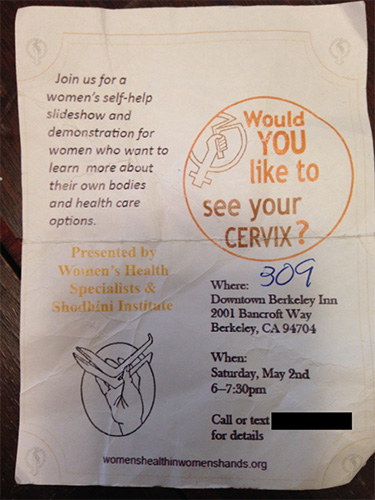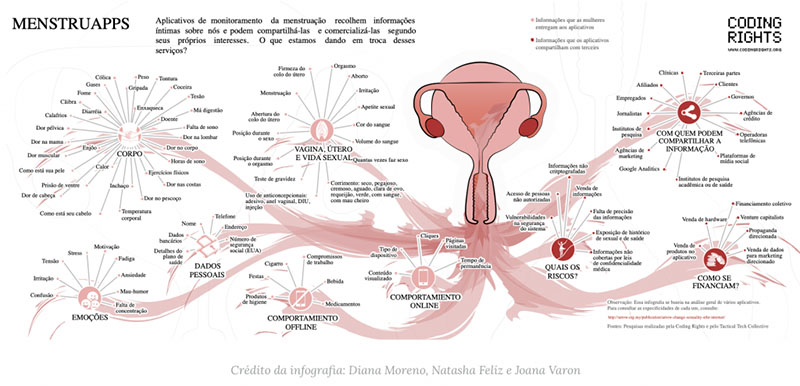They’re sleek and colorful, “fun and easy”, full of icons and dials. Period tracking apps, or “menstruapps,” are an increasingly common way a large segment of the population attends to their health and embodied experience of menstruation. In some ways, these apps are part of very recent trends towards the Quantified Self, the datafication of health, and reliance on biometric tracking devices to “optimize” one’s habits. In other ways, they evoke older legacies of feminist health care, notably the Our Bodies, Ourselves movement begun in 1969. Fifty years later, what does it mean to use technology to “understand how your body works”, as Clue advertises, or “take control of your body,” the tagline for Natural Cycles, which are two of the most popular menstruapps?
I started thinking through this question with a set of pilot interviews from summer 2019. The six interviewees were between the ages of 20-35, had high levels of formal education, and lived in the urban US. Presenting preliminary conclusions at the (In)tangible Technology and Data conference at the University of Helsinki in October helped develop my thoughts in conversation with the other participants.
In this post, I think about the way that menstrual apps take up the Our Bodies, Ourselves legacy of self-knowledge via feminist technology, while also introducing new and concerning issues — such as those surrounding privacy. In particular, I find it curious how being “in tune” with one’s body via data and technology breaks with gendered stereotypes about what intuition is, and how it works.
What is a “Feminist Technology”? Control over Technology, Control over Data

Cervix-finding parties still occasionally happen, such as this hotel-room event in Berkeley in 2015. Photo by the author.
The Our Bodies, Ourselves movement involved reclaiming control of technologies like the speculum, and using technologies like menstrual extractors to put care in women’s own hands. “Cervix-finding parties,” in which women would show each other how to use such devices, took place in living rooms and other spaces less dominated by capitalism, industry, and patriarchy (see Murphy 2012 for a detailed, critical cultural history of this movement and how it was nonetheless entwined with global systems of power). Such parties still occasionally happen, as I encountered a few times during fieldwork in the US in 2013-2016.
Period tracking apps also reclaim male-controlled technologies. Although the first wave of biometric trackers (and many still being produced) present themselves as “unisex” or universal, by not including period tracking, they exclude a fundamental aspect of a great many people’s bodies and health. For example, despite having existed since 2014 and being one of the major health apps, Apple Health only introduced period-tracking earlier this fall. By omitting menstruation, such biometric trackers reinforce male bodies as the default. In pushing back against a masculine norm and claiming space for menstruating people, menstruapps are a feminist technology.
Our Bodies, Ourselves was concerned with controlling physical tools and spaces, but moreover with sharing empowering information that women could use to look after their health, reproductive and otherwise. Menstruapps likewise give individuals a way to manage information about their bodies. However, they require sharing that information and thereby relinquishing some control over it. With the majority of apps, personal health data is sent and sold to companies that profit from it. Such information exchange is informed by tacit non-consensual connectivity instead of face-to-face sociality. Yet even though Our Bodies, Ourselves foregrounded woman-to-woman interactions, such feminist self-care health devices and practices were appropriated into global health-care regimes, and the concept of “reproductive health” launched by this movement tied women’s health care into patterns of systemic racism and classism (Murphy 2012). The history of feminist health care is entwined with the biopolitics of neoliberal capitalism, fifty years ago and today.
The privacy issue has been getting recent media attention. UK-based non-profit Privacy International released a report in September 2019 about Facebook automatically receiving data from numerous menstruapps, which could be (and almost certainly is) used to target ads to people. Brazilian coding rights group Chupadados (meaning Data Sucker) released a critical report contextualizing this scandal in the broader phenomenon of unpaid and undervalued reproductive work. They schematized menstruapps’ data issues in a useful interactive diagram copied below, enumerating the types of information collected by the apps on the left of the uterus image, and, on the right, detailing what happens with that information and its risks and consequences.

Brazilian coding rights group Chupadados schematized menstruapps’ data issues in this interactive diagram. Image courtesy of codingrights.org.
Our Bodies, Our (Quantified) Selves
Period tracking apps offer more than a calendar to record when you last menstruated, or predict when you next will. From when you had sex to the quality of your vaginal discharge, from how much caffeine you drank to the brittleness of your hair, the factors that can be documented are numerous and proliferating. This sort of information gathering creates an enormous amount of data, which can be tracked and organized into patterns by either the user or the app.
Tracing such patterns, especially between mood and cycle, was a primary motivation of the people I spoke with. Each of the six people interviewed mentioned app usage as part of an effort to be attuned to their bodies, though this took different forms. These apps, with their colorful calendars stretching into infinity, at least call to mind a sort of algorithmic predictability, and some have even begun offering diagnoses based on (rather thin) data patterns. Algorithmic predictability can be relieving or unnerving, especially for those whose bodies are not “regular.”
Data’s association with quantitative reasoning and factual truth figured into the interviews as an appealing way to make sense of messy lived experience. The proliferation of qualitative experiences that can be quantified by being input into an app, including mood and social interactions, blurs the boundary between qualitative and quantitative experience in the first place (Ruckenstein and Schüll 2017). What kind of attunement comes from digitally mediated data, versus “purely” experiential self-knowing?
In useful ways, self-knowing via app-mediated data pushes against the mythos of intuition. By “mythos,” I mean the idea that some people (read: women, especially those less educated and otherwise marginalized) have automatic and ineffable access to a kind of embodied truth. Such truth is both romanticized for being “natural” or “authentic,” and denigrated for being “unscientific” and unreliable. In scholarship about birth, intuition has been associated with interpersonal connection and “woman-centered care,” and opposed to technology and medical models of bodies as machines (Davis-Floyd and Davis 1997). I have elsewhere suggested that intuition is learned and cultivated through practice, a matter of paying certain kinds of attention, accessible to persons of any gender, like any other kind of knowledge (Ford 2017). To me, it seems that inputting data into an app is a way of cultivating one’s attention, and thereby developing attunement with one’s body. But because mobile apps and biometrics are so coded as “high tech” and implicitly opposed to “nature,” they break with this cultural idea of women’s intuitive self-knowledge even as they reproduce it.
While period tracking apps can be regarded as feminist technologies because they insist on menstruation as a critical part of health, and give individual menstruating people the power to attend to their bodies in “cutting edge” quantified ways, they are also shaped by power structures that complicate how we might feel about using such technologies. Of course, balancing between the tradeoffs should be a personal decision, but I hope that a robust public conversation about the role of tech company regulation and data protection in shaping the options from which we choose will not be far on the horizon.
Citations
Davis-Floyd, Robbie and Elizabeth Davis. (1997). “Intuition as Authoritative Knowledge in Midwifery and Home Birth,” In Childbirth and Authoritative Knowledge: Cross-Cultural Perspectives, edited by Robbie E Davis-Floyd and Carolyn Sargent, Univ of California Press.
Ford, Andrea Lilly. (2017). Near Birth: Gendered Politics, Embodied Ecologies, and Ethical Futures in Californian Childbearing. Dissertation: The University of Chicago.
Murphy, Michelle. (2012). Seizing the Means of Reproduction: Entanglements of Feminism, Health, and Technoscience.Durham: Duke University Press.
Ruckenstein, Minna and Natasha Dow Schüll. (2017). “The Datafication of Health.” Annual Review of Anthropology 46: 261–78.
